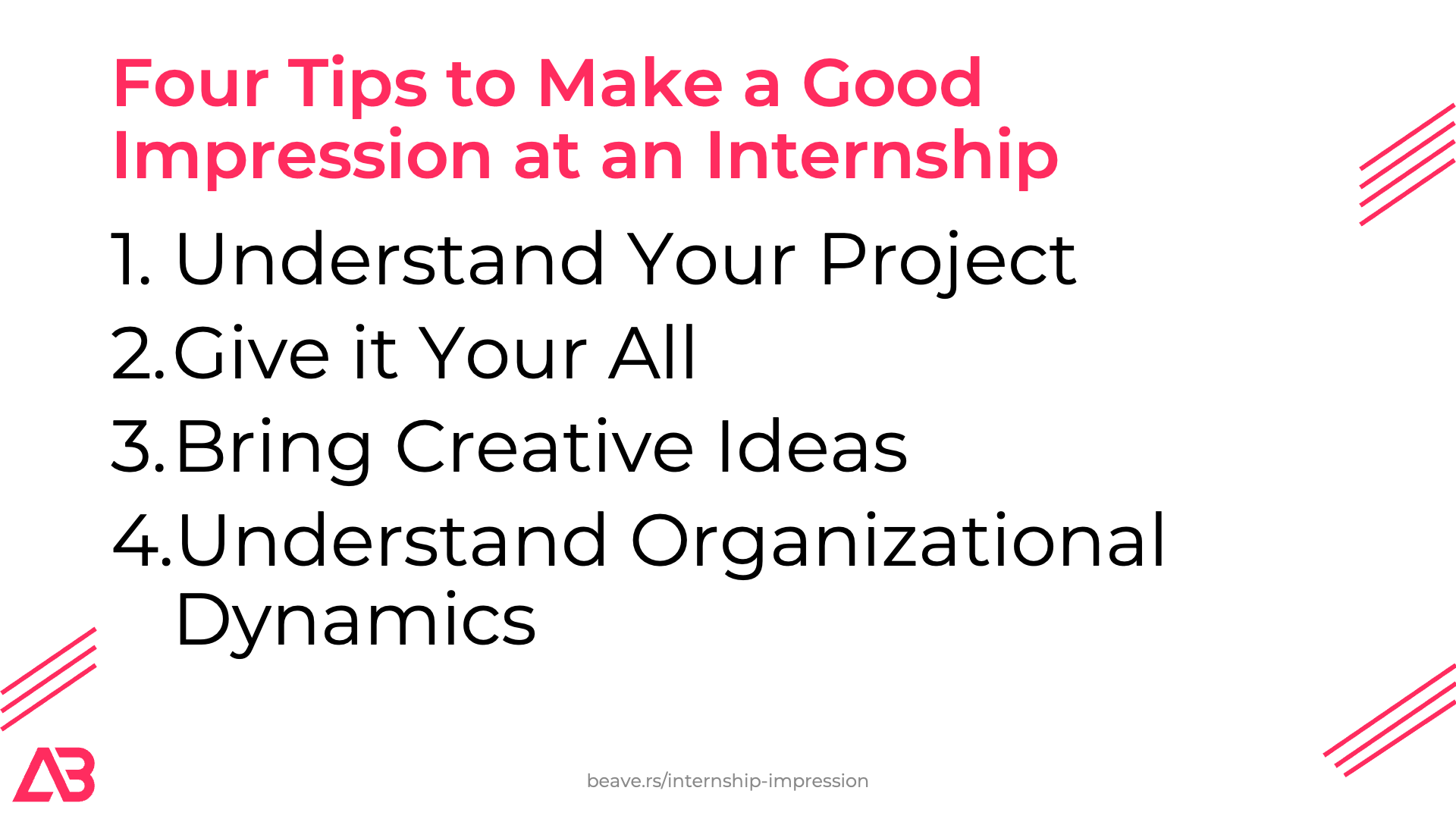When I entered my first co-op, I knew that I wanted to make a good impression. I knew that it would open more doors and grant me more opportunities. There was just one problem: I had no idea how I would do so. Ultimately, I think that I did a good job and made a good impression. In this article, I will share some of the things that helped me differentiate myself within my team and within the organization.

1) Understand Your Project
Most internship projects are part of a broader project or initiative. You will typically work with a team of other people who are all working on this larger project. A great way to make a good first impression is to show interest in, and learn about in depth, your larger project.
A great way to make a good first impression is to show interest in, and learn about in depth, your larger project
This carries many benefits:
- You can make sure that your own project aligns with larger objectives
- You can help identify flaws with the larger project earlier on
- You demonstrate that you care about the success of the entire team, and are thinking about the larger scope
- You can make sure that your project ends up being useful
For me, I had a several-hour-long call with my manager in the first week of my co-op. The call addressed the three core areas. for understanding a product:
Product-Market Fit:
- Who are our clients?
- What value do our clients get from us?
- How do we fit into their products?
- Why do our clients choose us over alternatives?
- What is our relationship with the integrating partner?
- Why do we have the sales model that we do?
Technical:
- What parts of the 3GPP network do we care about?
- What does our infrastructure look like?
- What happens when a device joins a network? What if it is roaming?
Direction:
- Where are we a year from now? 5 years from now?
- What are some of the greatest threats that our product faces?
- What are some market shifts that we expect to see in the future?
Thanks to this call, I was able to get moving quickly on my projects, and was able to make significant contributions later during the internship. This call was one of the best decisions I made during my first internship, and it meant that I had a much better experience than some of my peers. I intend to replicate this again. Generally, I would recommend doing it early in your internship, but once you have started learning things through osmosis (probably late first week or early second week). You need a good enough understanding of the team in order to ask insightful questions, so if you have it too early, you may not get sufficient value.
2) Give It Your All and Be Flexible
I know some people who, during their internship, did the bare minimum required to meet their objectives. That both leads to a bad experience and leaves a bad reputation. Especially when you are in an internship or early-career, you want to go the extra mile. Most managers will recognize a strong effort, even if the end result is not perfect.
Along these lines, you should be flexible. Business needs change, and you should be prepared to change with it. Your project may no longer align with the team's direction, and if that happens, the best thing you can do is start a new project that aligns with the team's direction. It is not about sinking the work you have done; it is about maximizing your impact.
"Work-Life Balance"
"Work-Life Balance" is a contentious issue in organizations, and the approaches vary widely by team. The phrase in particular, and the concept generally, may be seen negatively by some teams (especially engineering teams or smaller organizations). You should try to figure out what the company culture is like before you join, and reflect whatever your team members are doing. Generally speaking, caring more about your job is not likely to hurt you, but caring less than other people (either interns or full-time) may leave a very negative impression.
If you are looking for a strong "work-life balance," look at government or large enterprises (not in the finance or tech verticals). They generally are more accepting of disconnecting at 5PM. Smaller companies or Tech/Finance companies usually have higher expectations. Be aware that strong work-life balance will likely come with a pay sacrifice, both for internships and especially for full-time.
3) Bring Creative Ideas
A lot of teams are looking to improve themselves. When a new person is brought in, it can be a good opportunity to improve how a team operates and what they are working on. As such, you can make a good impression by respectfully identifying opportunities for improvement.
I did this early on during my first co-op. I saw that we were burning a lot of time on our daily stand-up meetings. I had experience running stand-ups before, so I politely suggested that I thought we were burning a lot of time on scrum, and had three suggestions on how I thought we could improve:
- Only block out 15 minutes on the Outlook invite, but block out an hour of down time, in case technical discussions need to happen or the meeting runs long
- Ask everyone the three questions every day: what have you done, what are you working on, what are you blocked by
- If anyone is blocked, ask them to schedule a meeting with stakeholders (possibly in the 45 minutes of reserved time) and get unblocked as quickly as possible
I did this several other times throughout the internship as well. It is important to be suggesting but not be disrespectful in your process. If the answer is no, accept that answer. That being said, you were hired for your ideas. If you see opportunities for improvement but do not voice them, it could end up hurting the team. Generally speaking, everyone I have worked with has been respectful of my ideas, and I don't think I have ever received blow-back for some. I generally use the phrase "what I have seen work well before is ..." as a way to handle the politeness.
4) Understand Organizational Dynamics
Corporations are hierarchical. The single best thing that you can do for your reputation is to make your manager look good. If you can make your manager's manager look good, that is even better. And this process works all of the way up the chain to the CEO, board, and shareholders.
Granted, especially in larger companies, it is rare that you will be interacting directly with the CEO, board, or shareholders. That being said, you may be in meetings with multiple levels present. If this happens, and especially if you are expected to contribute, you will want to understand what the highest-ranked person cares about, and what his or her manager cares about.
Your project is a piece of a larger puzzle that these people are responsible for. Most managers have something that "keeps them up at night" and there is a strong chance that your project fits into that. If you can articulate your ideas, addressing the levels all of the way up the chain, it reflects positively on everyone ranked between you and them. Thus, everyone will have greater appreciation for you.
How I Prepare for Multi-Level Meetings
There may be times when you are in meetings with people who are higher than just your manager. In this case, you should ask your manager ahead of time what their expectation for you is. Are you there just to listen? Are you supposed to contribute? Setting these expectations early can help ensure that you do not act in an improper way.
Internship Presentations
You may be asked to present or talk about your work at some of these multi-level meetings. Many internships have an end-of-term "intern day" where everyone talks about their projects. Others may have meetings internally where you give status updates, and you may be asked by your manager to talk about your specific contributions.
In this case, I always recommend following the rule talk to the highest-ranked person in the room. This rule means that your content should be based around their priorities, needs, concerns, and level of technical understanding.
It works well for everyone when their manager is happy with their work. So, if the highest-ranked person likes your work, it reflects positively on everyone in the hierarchy between you and them. I got very good feedback on my internship presentation by taking this approach.
The best way to approach this is by asking your manager who the highest person is, and then further questions to help you tailor your content to them. You may also may be able to find information about this person through internal company directories and wikis or through LinkedIn.

